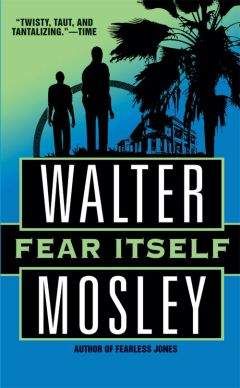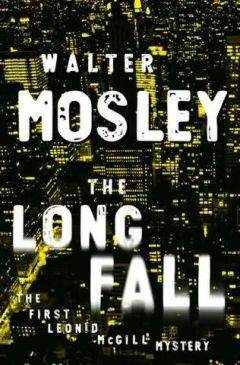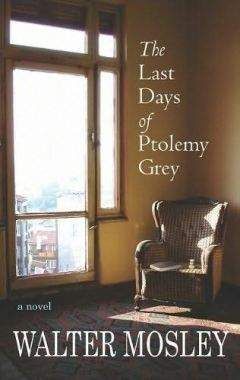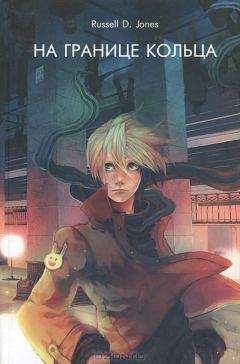Walter Mosley - Fearless Jones
Wally belched loudly. His face contorted with nausea.
“Why you quit that market?” I asked.
Theodore tried to look me in the eye, but he couldn’t. He struggled against tears and was mostly successful.
“I’m sorry,” he whispered. And then, when he’d gained more of a mastery over his tears, “I’m sorry,” in a surer tone.
“That’s okay, man,” I said. “That’s okay. Just tell me what you know. ’Cause you know I plan to get my due.”
Theodore Wally was as scared a man as I had ever seen. He was trembling, near tears and full of gas, but still he managed to maintain the semblance of a man standing his ground. I couldn’t understand why he was so afraid.
“I’m sorry I burned down your bookstore, Paris,” he said.
“What! You?”
“He told me to, and I did it ’cause I always did what he said. Mr. Antonio was like my father, you know. I been with him fourteen years, since I was a kid.”
“You did it?”
“I told him about the man, the man who hit you. I told him that I saw you drive off, and then I saw that man go after you in his car with bull horns. He said to wait till late, an’ if you didn’t come back to burn down your store. He paid me, but I couldn’t stand it, so I quit. He gave me eight hundred dollars. But you can have it, Mr. Minton.” With that he fell on his knees and reached under the sofa, coming out with a manila envelope. He ripped the paper pouch open and grabbed at the tens and twenties as they fell. He went down on his knees again, gathering the money up. When he had gotten it in two fistfuls, he held them up to me and said, “Take it. Please take it and forgive me.”
“Damn,” Fearless said.
I knew what he was thinking, that I had gotten into more trouble in one day than he had in a lifetime. It made me mad, so mad that I slapped the clerk with the back of my hand.
It wasn’t a hard slap, but it caused Theodore to bleed from the corner of his mouth.
“Take it,” he said again.
“How could you do that to me, man?”
“He told me that you’d get the insurance. He said that his lease was up and that he needed to buy the lot next door or he was gonna go outta business. He said you’d get the insurance and that nobody’d get hurt if you was gone. It wasn’t until after that I found out you didn’t have any insurance.”
“Even if I did, where was I gonna get more books? Where was I gonna have a new store if the one I had burned down?”
“He used to send my momma groceries when she was sick,” Wally said. “He said it was all gonna be okay. Just take the money. Take it please.”
I slapped him again.
Fearless was shaking his head.
I hit Wally with my fist, and he fell down upon his knees. The money went every which way. He crawled among the bills gathering and bleeding on them at the same time.
“Why you think I’m in all this shit? Huh? Why you think I’m out here riskin’ my life? It’s ’cause you burned down my store. If I’d’a come home to my place, I would’a let it drop. I would’a let Fearless outta jail and give him a place to stay till everything was okay.”
Theodore wasn’t listening. All he did was grab at the money, weeping blood.
There was an iron crowbar in the corner, next to the window. I picked it up.
“You the one messed up my life!” I yelled.
I didn’t even feel my arm rising above my head. I had no idea I was swinging the crowbar until something stopped the sweep of my arm.
“Paris,” Fearless said. His powerful grip had stayed the execution.
“What?”
“Take the money, man.”
Theodore had gathered the cash again. He clutched it in both hands. I couldn’t take it, so Fearless collected it for me.
While he was straightening out the bills I asked, “How much did you say it is?”
“Eight hundred dollars,” Wally said, “near about.”
“To burn down my life?”
“I’m sorry.”
“I bet ya he paid you more than that,” I said. “’Cause you had to pay somethin’ for them flowers and that monkey bite.”
“I got them from my girlfriend,” he said, finding some backbone. “She kiss me for nuthin’ and tried to make my house like a home.”
By then there was the ice of murder in my veins. Not murder that I wanted to commit, but the murder I had almost done. I had almost killed Theodore, and that frightened me. I never believed it when people said that they lost control, that they blacked out like Morris said and killed without volition. Until that very moment I believed that a man made his own decisions, that the excuse of passion was just a lawyer’s lie.
I WAS TOO worked up to drive, so Fearless took the wheel. He cruised down Slauson, keeping quiet while I fumed.
After a few blocks I said, “Damn. Damn.”
“He couldn’t help it, Paris. You know Antonio been good to him. He probably never even read a book.”
“What difference does that make?”
“He didn’t know what he was burnin’, man.”
“Let’s go see Milo,” I said to my friend. “Maybe he got somethin’ for us.”
“Whatever you say, Paris.”
33
MILO WAS LEANING back in his chair with his fingers laced across his belly and a smile on his lips. He wasn’t on the phone or reading. He wasn’t doing a thing. I got the feeling that he was sitting there, being smug with himself, waiting for us to arrive and hear his glad song.
“Fearless. Paris. How you’all boys doin’?”
“I hope you don’t choke on that canary you swallowed,” I said.
“It’s more like a goose, son. The goose that lays the golden egg.”
“Where’s Loretta?” Fearless asked.
“I thought it was best if she took a few days off,” Milo said, his voice suggesting more.
“I’ll bite,” I said.
“I went to see Lawson and Widlow,” Milo admitted. “I took a business card that said my name was Brown. I told them that I had a client named Love who had found a bearer bond worth a few thousand dollars to the owner.”
I could see that Milo intended to earn his thirty-three percent.
“And what did they say?” I asked.
The bailbondsman sat forward. “At first they acted like they weren’t too concerned. But when I suggested shopping the bond around, they said that that wouldn’t be such a good idea. They let it drop that I could get in trouble if the wrong people found out about the bond. I said maybe I should go to the police. They offered me a finder’s fee right then and there.”
“How much?” Fearless asked.
“Five thousand dollars.”
“What then, Milo?” I wanted to know.
“I said some names then. Leon Douglas. Fanny and Sol Tannenbaum. I said that that wasn’t all, and I wanted some real money for my client or they was gonna be up to their elbows in J. Edgar.”
“So where’d you leave it?”
“I got a answerin’ service under the name’a Brown at a switchboard downtown. I gave Widlow the number and told him to call me inside of a day.”
“Have they called yet?”
“I was waitin’ for you’n Fearless to come ’fore I checked.” With that he picked up the receiver and dialed. He waited no more than the span of a ring and said, “Brown, sixteen-sixty-four.”
Milo looked up and started snapping his fingers at me. He made the motion of writing and pointed at Loretta’s desk. I ran over, finding a yellow pencil and an unused envelope. I brought these back to Milo’s desk.
“Hold on, hold on,” Milo was saying into the receiver. “I got to get a pencil. All right, go on. Yeah. Three-two-one? Oh. Uh-huh. Is that all? Well then I thank you.”
Milo frowned at the words he had written down, then he smiled and said, “They wanna meet us at their office tonight at eight-fifteen. They said that the security guard’ll meet us at the side door in the alley and let us upstairs. What do you think about that?”
“We ain’t got the bond,” I said.
“A sheer technicality, my boy,” Milo responded cheerfully. “If Lawson and Widlow are still looking, it means that your girlfriend hasn’t brought it to them yet.”
“The bond’s worthless,” I said. “Well, not worthless, but only worth the face value.”
“How would you know that?”
I related the improbable tale of two American Negroes and the Israeli secret service.
Milo wasn’t phased. “Well,” he said. “Lawson and Widlow don’t know that. We just jack up the price to ten or fifteen thousand and let them find out on their own.”
“Yeah,” Fearless added. “But we tell ’em that it ain’t no deal unless we sit down with Zimmerman.”
“Why complicate matters, Mr. Jones?” Milo asked. “Get the money and get out, that’s what I say.”
“Money ain’t everything, Milo.”
Milo tried to argue, but Fearless wouldn’t budge.
MILO GAVE Fearless a small .32-caliber pistol that he had taken as a payment from a man charged with distributing counterfeit bills. It was not the kind of weapon Fearless commonly used.
“I usually like somethin’ wit’ more bite,” he said. “But in a sitchiation like this, somethin’ small is even better.”
“Situation like what?” I asked. We were driving toward downtown. Fearless was testing different places to conceal his weapon. He tried his belt, the sleeve of his windbreaker, even in the elastic of his sock.
“Whenever a man tell ya he gonna meet you at the side door, you know he got somethin’ t’hide,” Fearless said. “An’ if he’s hidin’ one thing, then he might be hidin’ somethin’ else. An’ then you got to worry. Me, I don’t like to worry, so I just hide somethin’ myself.” With that he shoved the pistol in his pocket and shrugged.
“Well, you just keep that thing in your pocket, Mr. Jones,” Milo said from the backseat. “This here is just business. Plain and simple business.”
“Okay,” Fearless replied.
I remembered something that my uncle Lonnie used to say. Trouble with a friend who stand by you in time’a need is that you usually got to be in trouble to enjoy his company.
LAWSON AND WIDLOW’S OFFICE was in a six-story stone building on Wilshire. There was a big glass door and vines trained to cover the walls. The windows were large. Garish floodlights bathed the edifice so that it looked official and important on the otherwise dark street.
A big and brawny white man met us at the side door. His face was bland with smallish features. It wasn’t a face that I recognized, but still I thought that I’d seen him before.
“What, three?” he asked. “There’s only supposed to be one.”
His accent sounded European, but I was no expert. It was familiar, though I couldn’t remember where I’d heard the cadence before.
“These are my partners,” Milo said in an officious tone, as though he expected the stranger to hop out of the way. He was acting like a black man who had never experienced racism, who expected his due with no arguments or questions.
The white man didn’t like the idea of partners but finally decided that he couldn’t make us disappear.
“Come,” he said gruffly.
We followed him up three narrow and unlit flights of carpeted stairs. Everywhere was dark until we arrived on the fourth floor, where a light shone from behind a glass door at the end of the hall. Our chaperone opened the door and ushered us in with a gesture of his hand.
Fearless was the first one through the door, then Milo and me, followed by the big man. We all three had different reactions to what we found there.
Fearless swiveled his head around to get the lay of the land. Milo looked at the small suited man behind the desk and sputtered, “What’s this supposed to mean?”
I was proud that I didn’t let the fear I felt come out when I greeted our host.
“Hello, Mr. Minor,” I said. “I wondered when you’d show up again.”
The little man squinted at me. “Rome? No, Paris. You were at the Tannenbaum’s house, no?”
“Yes,” I said.
“Hey, brother,” Fearless said.
When I looked to my right to see who it was that Fearless was greeting, I felt a clenching spasm down in my bowels. Leon Douglas, his eye still puffy and his jaw swollen, stood next to another evil-looking black man. The stranger was taller by an inch and twenty pounds lighter than Leon. He wore a cowboy hat.
Both men glared at us.
“What is the meaning of this?” Milo said again. “Where’s Mr. Widlow?”
“Mr. Widlow suggested to me that the principals should work out the specifics of this transaction,” the little man said. “Sit down, gentlemen.”
Fearless grabbed the chair closest to Leon and his friend, who stood against the wall on our right. The big white man who let us in leaned against the door behind us.
Minor was seated at a vast maple desk that was empty of papers or books or anything else to distract the eye. All he had was a lamp with an opaque green glass shade. Mr. Minor/Zimmerman smiled and nodded.
“How is Sol?” he asked.
“Dead,” Fearless said.
“We have business, yes?” our host asked. Sol’s death was not even worth his notice.
“Who are you?” Milo asked.
“I am Zev Minor.” I would have never known it was a lie from his delivery. He was just a feeble uncle too old and weary to waste time trying to fool you. “And this is Mr. Christopher,” he said, gesturing to the man behind us.
Fearless had his head turned away from Minor. He was pretending to read the titles on a shelf of books. That way our back was covered.
“I think you already know Mr. Douglas. His friend’s name is Mr. Tricks.”
“Just Tricks,” the cowboy said.
“We represent Lawson and Widlow in this business about the bond.” The last three words betrayed the gravity of his interest.
It was then that I remembered where I had seen Mr. Christopher. He was the big man leaving the Messenger of the Divine storefront on the night I was so cold and sleepy.
“This is totally unacceptable,” Milo said, sputtering as he spoke. “I was to meet Mr. Widlow, and I expect to meet with him …”
Milo kept talking because he sensed danger. Words were Milo’s weapons, so he pulled them out. I wasn’t concerned about the bailbondsman or his fears, but when I looked over at Fearless, I saw that his hand had edged nearer to his gun pocket. Fearless was preparing to fight for his life. I could see that in his posture and the almost imperceptible furrow at the center of his brow. I wasn’t worried about Fearless though — if anybody could survive that kind of battle, he could, but the odds for me and Milo weren’t so good.




